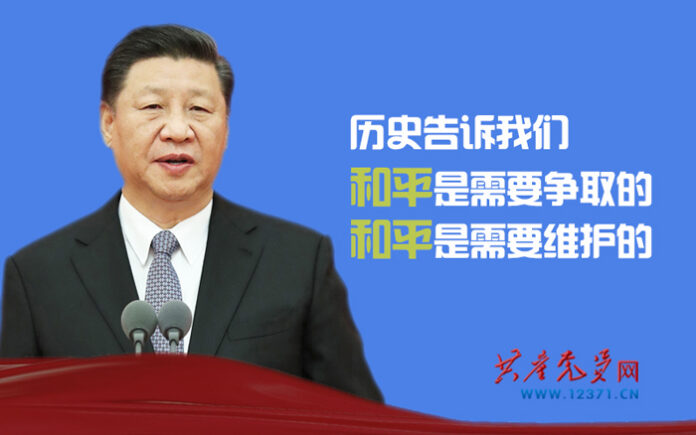
The Chinese nation has historically been characterized by a profound commitment to peace. Across both interpersonal and international relations, many Chinese adhere to the principle: “If others do not offend me, I will not offend them.” This tenet, rooted in traditional virtues, reflects a noble and gentlemanly ethos.
However, as China was thrust into the modern international system—governed by power politics and strategic rivalry—this principle became increasingly untenable, despite its more assertive caveat: “If others attack me, I will attack them.” In the contemporary geopolitical landscape, states frequently engage in strategic competition, often employing deterrence and intimidation as central tactics. An explicit policy of “not firing the first shot” can be interpreted by adversaries as passivity, effectively inviting unchecked provocations so long as they avoid initiating hostilities. While the establishment of clear red lines may prevent miscalculations, it also exposes strategic vulnerabilities that opponents can exploit.
A stark historical example of this dynamic occurred during the Sino-French War (1883-1885). Following France’s invasion of Vietnam—a Qing tributary—the French fleet entered Mawei Port near Fuzhou in July 1884. Despite the absence of a formal declaration of war, and under the terms of unequal treaties granting French access to Chinese treaty ports, the Qing naval forces refrained from engaging the intruding fleet. This resulted in the anomalous situation where opposing fleets coexisted in the same harbor, even as tensions mounted. The French exploited this restraint, conducting hydrographic surveys and intelligence gathering with impunity, before launching a surprise attack on August 22 that annihilated the Imperial Chinese Navy within half an hour.
While the Qing fleet was inferior technologically—wooden steam-powered vessels compared to France’s more modern warships—the magnitude of the defeat was unusual. The root cause lay in Qing strategic restraint, driven by orders to avoid provoking conflict. Any premature Qing offensive, even if victorious, would have been politically condemned as an act of aggression, ceding the moral and diplomatic high ground to France.
This is not to cast simplistic judgments of weakness or incompetence upon the Qing government, nor to invoke outdated accusations of subservience to imperial powers. Rather, the Qing leadership’s caution reflected a complex calculus shaped by multiple factors. France, despite recent setbacks in the Franco-Prussian War, remained a formidable power; the nascent Self-Strengthening Movement was only beginning to bear fruit and could not afford disruption; the Qing faced simultaneous tensions with Russia and Japan; and, critically, intense internal political rivalries rendered the court highly unstable and risk-averse.
Similar patterns of restrained military engagement recurred throughout modern Chinese history. During the outbreak of the First Sino-Japanese War in 1894, the Beiyang Fleet was ordered explicitly not to fire the first shot, even as Japanese forces initiated hostilities. This pattern of restraint extended to incidents preceding the September 18 and July 7 provocations, with Chinese forces repeatedly demonstrating forbearance despite mounting provocations.
Such repeated “not firing the first shot” policies invite critical reflection. Conventional wisdom—even among children—recognizes that the weaker party benefits from seizing the initiative to gain advantage. Yet modern China, often the weaker adversary, persistently avoided offensive action. This reticence stemmed not simply from national character or moral superiority but from the geopolitical and domestic realities of the time.
China’s historical predicament was one of being perpetually surrounded and attacked, facing multiple simultaneous threats rather than isolated adversaries. During the Sino-French War, tensions with Russia, Japan, and Western powers converged, constraining any government’s willingness to gamble on open conflict. Conversely, Japan’s ability to “strike first” reflected a distinct strategic environment: fewer external threats, more clearly defined enemies, and greater internal cohesion, enabling decisive “one-on-one” engagements such as the First Sino-Japanese War and the Russo-Japanese War.
Furthermore, internal political instability critically shaped China’s strategic posture. The Qing dynasty’s minority Manchu rulers distrusted the Han majority, prioritizing regime security over national defense. Cixi’s infamous dictum that it’s better to concede to foreign powers than to domestic rebels exemplified this prioritization. Subsequent governments, from the fragmented warlord era to the Nationalist regime, similarly lacked the unified authority and internal stability necessary to confidently confront foreign threats.
Lastly, the desire to preserve China’s nascent modernization efforts—railroads, telegraphs, steamships—tempered enthusiasm for military conflict. Wars, especially against technologically superior foes like Japan, repeatedly disrupted China’s developmental trajectory, undermining progress achieved during the Self-Strengthening Movement and the “Golden Decade” of the Republic.
In sum, China’s historical reluctance to “fire the first shot” in the face of foreign aggression must be understood as a product of complex strategic considerations: a precarious external environment marked by multiple threats, internal political fragility, and a determined pursuit of modernization. These factors collectively shaped a cautious defense posture—one that, while sometimes costly, reflected pragmatic calculations rather than mere passivity or weakness.
Source: 12371, CGTN, People’s Daily



